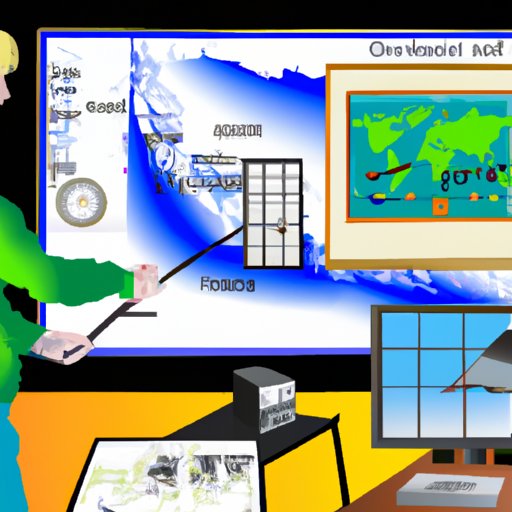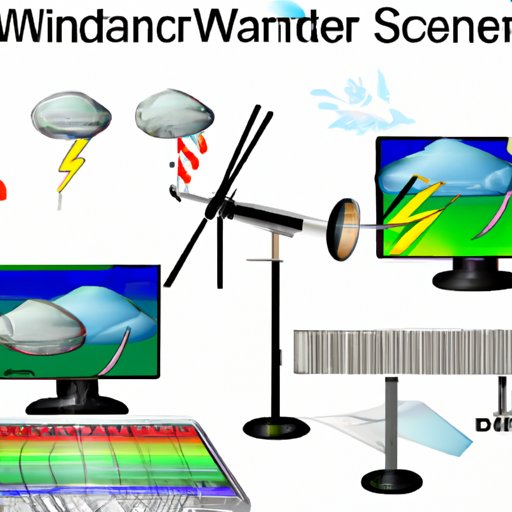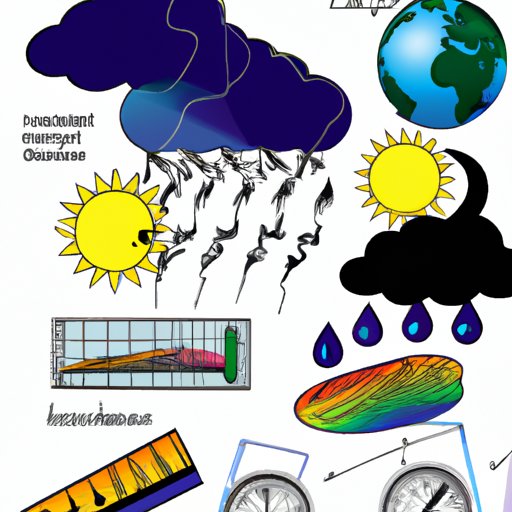Introduction
Meteorology is the branch of Earth science that studies the atmosphere, including the physical processes and phenomena associated with the weather. Meteorologists use their knowledge of atmospheric physics, chemistry, and dynamics to monitor, understand, and forecast the weather and climate. From predicting snowstorms to monitoring hurricanes, meteorologists play a critical role in modern society by providing valuable information about severe weather events.
Exploring the Science of Weather: An Introduction to Meteorology
To fully understand the science of meteorology, it is important to first define what the term means. At its core, meteorology is the study of the atmosphere and its physical properties, as well as the processes and phenomena associated with the weather. This includes the study of temperature, humidity, air pressure, wind, clouds, precipitation, and other variables that affect weather patterns.
What Does a Meteorologist Do? A Look at the Profession of Weather Forecasting
The primary job of a meteorologist is to gather data from various sources and analyze it to predict future weather patterns. They are responsible for examining real-time weather conditions using specialized instruments such as radar and satellite imagery, collecting historical weather data, and studying existing weather models. With this information, meteorologists can make informed decisions about current and future weather conditions.

How Meteorologists Monitor and Predict Weather Patterns
Meteorologists use a variety of instruments and technologies to monitor and predict weather patterns. These include radar systems, satellites, thermometers, barometers, and hygrometers. Each of these instruments measure different aspects of the atmosphere, such as air pressure, temperature, humidity, wind speed, and cloud cover. By combining this data, meteorologists can create accurate forecasts.
In addition to monitoring weather conditions, meteorologists also study synoptic scale weather systems. Synoptic scale weather systems are large-scale cyclonic systems that extend across multiple states or countries and are responsible for producing long-term changes in weather patterns. Meteorologists use their knowledge of these systems to accurately predict long-term weather patterns.

The Role of Computers in Meteorology and Weather Forecasting
Computers play an integral role in modern meteorology and weather forecasting. Meteorologists use computer models to simulate and analyze weather data and generate accurate forecasts. Computer models are based on mathematical equations that take into account variables such as air pressure, temperature, humidity, wind speed, and cloud cover. By inputting this data into a computer model, meteorologists can generate detailed forecasts of upcoming weather patterns.
In addition, meteorologists are now utilizing artificial intelligence (AI) and machine learning to improve their accuracy in predicting weather patterns. AI and machine learning algorithms can take into account far more variables than traditional computer models and can generate highly accurate predictions.

Understanding the Effects of Climate Change on Weather Patterns
Climate change is one of the most pressing issues facing our planet today, and it has had a significant impact on global weather patterns. As temperatures continue to rise due to increased greenhouse gas emissions, weather patterns have become more unpredictable and extreme weather events have become more frequent. Meteorologists must take into account the effects of climate change when analyzing and predicting weather patterns.
A recent study published in Nature shows that climate change has already impacted global weather patterns. The study found that over the past 30 years, the frequency of extreme weather events such as heat waves and heavy rainfall has increased significantly due to global warming. As temperatures continue to rise, meteorologists will face increasing challenges in accurately predicting weather patterns.
Conclusion
Meteorology is an important branch of Earth science that studies the atmosphere and its physical processes and phenomena associated with the weather. Meteorologists use a variety of instruments and technologies to monitor and predict weather patterns, utilizing computer models and artificial intelligence to generate accurate forecasts. In addition, meteorologists must take into account the effects of climate change on global weather patterns. Meteorology plays a vital role in modern society, as meteorologists provide valuable information about severe weather events and help us prepare for the future.
(Note: Is this article not meeting your expectations? Do you have knowledge or insights to share? Unlock new opportunities and expand your reach by joining our authors team. Click Registration to join us and share your expertise with our readers.)
